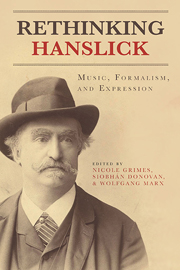Book contents
- Frontmatter
- Contents
- Foreword by Mark Evan Bonds
- Acknowledgments
- Abbreviations
- Chronology
- Introduction
- Part One Rules of Engagement
- Part Two Liberalism and Societal Order
- Part Three Memoirs and Meaning in Social Contexts
- Part Four Critical Battlefields
- 12 Hanslick and Hugo Wolf
- 13 Battle Rejoined: Hanslick and the Symphonic Poem in the 1890s
- 14 On “Jewishness” and Genre: Hanslick's Reception of Gustav Mahler
- Selected Bibliography
- List of Contributors
- Index
12 - Hanslick and Hugo Wolf
from Part Four - Critical Battlefields
Published online by Cambridge University Press: 05 July 2013
- Frontmatter
- Contents
- Foreword by Mark Evan Bonds
- Acknowledgments
- Abbreviations
- Chronology
- Introduction
- Part One Rules of Engagement
- Part Two Liberalism and Societal Order
- Part Three Memoirs and Meaning in Social Contexts
- Part Four Critical Battlefields
- 12 Hanslick and Hugo Wolf
- 13 Battle Rejoined: Hanslick and the Symphonic Poem in the 1890s
- 14 On “Jewishness” and Genre: Hanslick's Reception of Gustav Mahler
- Selected Bibliography
- List of Contributors
- Index
Summary
Hugo Wolf spoke with the voice of both artist and critic. The reviews he wrote for the Wiener Salonblatt in 1884–87 before achieving lasting success as a composer of lieder provide fascinating glimpses into the concert life and musical politics of contemporary Vienna; they also provide rich insight into the relationship between composer and critic. By promoting the music of the New German School, Wolf placed himself squarely in opposition to Eduard Hanslick and Viennese cultural conservatism, thus joining in a larger struggle between proponents of traditionalism who championed Brahms and a stridently progressive faction that elevated Wagner to near godlike status. In this larger conflict, political maneuvering along party lines drove the rhetorical and tactical engines of war, and both camps made exaggerated claims about the lack of artistic worth and aesthetic insight of the other. Subsequent commentators suggested that as critics Hanslick and Wolf are known to history largely for judging the artistic hero of the other side too harshly: Hanslick for a few “mistakes” he made about Wagner, Wolf for a few “foolish things” he said about Brahms. My purpose in the current essay is to look beyond the sometimes ridiculous invective and examine the subtext of the quarrel between Wolf the artist and Hanslick the critic, a quarrel that manifested itself in Wolf's music as well as his criticism, and in Hanslick's autobiography, Aus meinem Leben.
- Type
- Chapter
- Information
- Rethinking HanslickMusic, Formalism, and Expression, pp. 261 - 288Publisher: Boydell & BrewerPrint publication year: 2013

